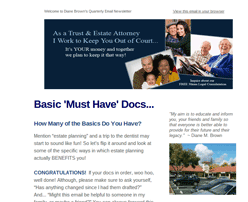Ask an Attorney – When to do a Trust?
Categories: Ask an Attorney, Ask Diane - Q & A and FAQs, Living Trusts, Trust and Estate Attorney
 People want to “ask an attorney” all sorts of questions about their estate plan – it is a very natural response when they find out what I do. This is one of the reasons I love speaking to groups. It can be a group of business professionals, seniors, or a neighborhood association. I have spoken at libraries, community centers, conference rooms and restaurants. The idea here is to get folks talking. For each person that asks a question, there are others in the room who have the same question or concern. In general, the eventual death themselves or of a loved one is not something people like to discuss. “If I don’t think about it, it won’t happen.” Or, “I’ll just kick that can down the road a bit and take care of all that NEXT year.” This is the mindset of so many people when I first meet them at an event.
People want to “ask an attorney” all sorts of questions about their estate plan – it is a very natural response when they find out what I do. This is one of the reasons I love speaking to groups. It can be a group of business professionals, seniors, or a neighborhood association. I have spoken at libraries, community centers, conference rooms and restaurants. The idea here is to get folks talking. For each person that asks a question, there are others in the room who have the same question or concern. In general, the eventual death themselves or of a loved one is not something people like to discuss. “If I don’t think about it, it won’t happen.” Or, “I’ll just kick that can down the road a bit and take care of all that NEXT year.” This is the mindset of so many people when I first meet them at an event.
Once people engage, start to listen, as they talk and actually ASK the questions they have been reluctant to ask, they begin to realize there are many things that they CAN control. They can have control over things in their life now in the case of a major life challenge or serious medical scare, toward the end of their life and after they are gone. When I start to see people open up and relax – it’s a good day. There is real peace of mind and financial benefit for those who create a plan. And it all starts with a question. Remember… Knowledge is Power!
Quick Note: Because every situation is different, the following should be considered “general information.” It is not meant to apply to your specific situation. Please seek the advice of counsel.
Recent Questions Regarding Trusts as Part of an Estate Plan
QUESTION: My neighbor says I do not need a living trust because I have less than $5,000,000 in assets. Is that right?
ANSWER: People often mix up the estate tax limit (currently over $5,000,000 for an individual and over $10,000,000 for a couple) with the cost of administering the estate. Usually when a person dies there will be an administrative process through the court that is used to transfer assets from a decedent to his or her beneficiaries. Probate costs, consisting of attorney’s fees and court costs, may be figured on the value of any estate that exceeds $150,000 gross value. A living trust will considerably reduce the cost of administering the estate by eliminating the need for probate.
Meeting with a trust and estate attorney allows you to weigh your options in an educated and informed way. The attorney can put some hard numbers to the cost of setting up a trust now; in comparison to the anticipated costs and certain delays associated with the same estate should it go into probate. You may be surprised to see that in the “pay now vs. pay later” comparison, just how much a living trust can benefit the beneficiaries of your estate. As you consider the terms of your living trust, you can also look at naming a financial and/or medical power of attorney and make sure that you have an advanced medical directive in place. Peace of mind for you, your family and the others you love is a great motivating force as you handle these details. The first step is to talk to a legal professional who specializes in trusts and estate law so that you can get some answers regarding what is best for YOUR situation and your estate – regardless of how big or small it is.
QUESTION: How much does probate cost?
ANSWER: The attorney’s fees are computed on a sliding scale. For example, an estate consisting of a home worth $900,000 (with a mortgage of $500,000) plus a small bank account of $100,000 would pay $23,000. Add an additional $1,500 for the court costs. Does that seem high? Remember that the cost is based on the gross value of the estate. There is no discount for liabilities. In addition to the financial cost of probate there is the cost in time. Estates that go into probate can take on average a total of twelve months to come out the other site. Furthermore, there is the cost in privacy and anyone can read the court file. The file has a list of all assets and their values, the names and addresses of all relatives of the decedent as well as those of the beneficiaries of the estate. So in this example that is: $23,000 + $1200 + estate is tied up an average of 12 months + it’s all public/no privacy. THIS would be why people, once they actually understand the benefits of a trust, opt to put one in place. You can check with a trust and estate attorney in your area and have them take a look at your specific case. Make sure to ask if, like me, they offer a free initial consultation – it’s a great way to get some answers.
Los Gatos Residents Can Ask an Attorney in Person
If you live in Los Gatos, or another city in the San Jose area of California, and have questions about creating an estate plan and would like to ask an attorney, you are welcome to be in touch. You can print this Free 30 Minute Legal Consultation and have some of your initial questions answered at no charge! Just call the office and make an appointment. If you have questions or concerns about living trust or other estate planning documents, I encourage you to keep a list – simply jot things down as you think of them and bring the list to your appointment. This way you make the most of your Free Consultation and get answers to your most important questions right off the bat.
This “ask an attorney” blog contains general information and is not meant to apply to a specific situation. Please seek advice of counsel before proceeding as each case is unique.
 Diane M. Brown, Esq.
Diane M. Brown, Esq.
Working every day to keep my clients out of court!
It’s your money… Let’s keep it that way!
Call 408-364-1234






No comments yet.